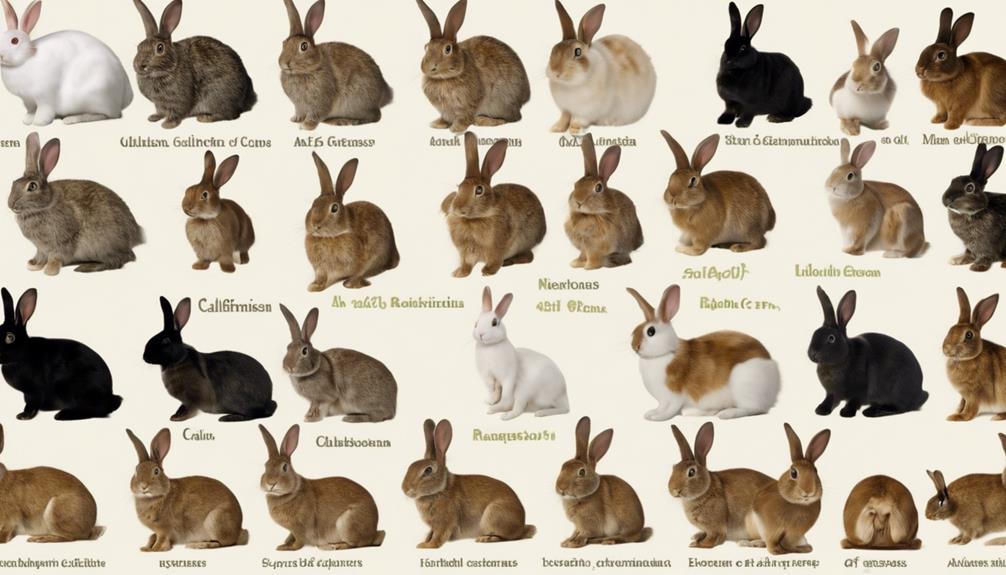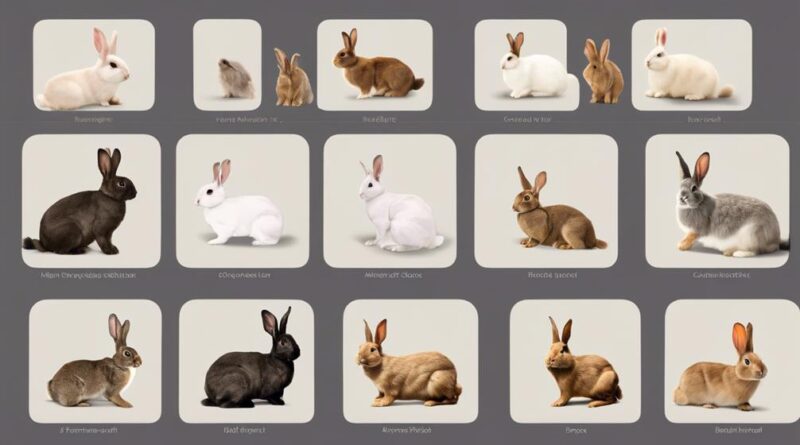Understanding Lifespans Across Various Rabbit Breeds
Ever wondered why some rabbits seem to live longer than others?
From the majestic Lionhead with its mysterious lifespan to the gentle Holland Lop known for its endurance, each breed holds a secret about longevity waiting to be uncovered.
As you start exploring the intricacies of lifespans across various rabbit breeds, you'll be intrigued by the factors that influence these furry friends' time on this earth.
Lionhead: Average Lifespan
When considering the Lionhead rabbit breed, their average lifespan typically ranges between 7 to 10 years. Genetic influences play a significant role in determining the lifespan of Lionhead rabbits. Selective breeding practices aimed at enhancing desirable traits while minimizing genetic health issues can influence how long these rabbits live. Additionally, environmental factors such as living conditions, exercise opportunities, and exposure to stressors can impact the overall health and longevity of Lionhead rabbits.
To ensure your Lionhead rabbit lives a long and healthy life, proper health care is essential. Regular check-ups with a veterinarian experienced in caring for rabbits can help catch any potential health concerns early. Monitoring your rabbit's weight, teeth, and overall well-being can also contribute to a longer lifespan. Providing a safe and enriching environment with adequate space for exercise and mental stimulation is crucial for promoting longevity in Lionhead rabbits.
Moreover, paying close attention to diet requirements is vital for the health and longevity of your Lionhead rabbit. A balanced diet rich in hay, fresh vegetables, and a controlled amount of pellets is essential for meeting their nutritional needs. Avoiding excessive treats and providing clean, fresh water daily are simple yet effective ways to support your rabbit's overall health and potentially extend their lifespan. By considering these genetic influences, environmental factors, health care, and diet requirements, you can help ensure your Lionhead rabbit lives a long and happy life.
Flemish Giant: Longevity
To understand the longevity of Flemish Giant rabbits, consider their average lifespan and key factors that influence their overall health and lifespan. Flemish Giants are known for their impressive size and gentle nature, but their longevity is also a significant aspect to explore.
- Longevity Factors
- Flemish Giants have a relatively long lifespan compared to other rabbit breeds, living on average between 8 to 10 years when well-cared for.
- Providing a spacious living environment with ample room to hop and exercise can contribute to their longevity.
- Regular veterinary check-ups and a balanced diet rich in hay, fresh vegetables, and a limited amount of pellets are crucial for ensuring a healthy and long life for Flemish Giants.
Breeding practices also play a vital role in determining the lifespan of Flemish Giants. Responsible breeding practices that prioritize the health and genetic diversity of the rabbits can lead to individuals with stronger immune systems and fewer genetic predispositions to certain health issues.
Holland Lop: Lifespan Expectancy
Considering the lifespan expectancy of Holland Lop rabbits sheds light on another fascinating aspect of rabbit breed longevity. Holland Lops are known for their adorable appearance and gentle temperament, making them popular pets. When it comes to their lifespan, various factors come into play, impacting how long they'll live.
Health factors play a crucial role in determining the lifespan of Holland Lops. These rabbits, like all breeds, require proper nutrition, regular veterinary check-ups, and a clean living environment to thrive. Ensuring that your Holland Lop receives a balanced diet, plenty of exercise, and preventative healthcare can contribute to a longer and healthier life.
Environmental influences also play a significant role in the lifespan expectancy of Holland Lops. Providing a safe and stress-free environment for your rabbit is essential. Factors such as temperature control, protection from predators, and mental stimulation can impact their overall well-being and longevity.
Mini Rex: Lifespan Range
Mini Rex rabbits typically have a lifespan range of 7 to 10 years, making them a popular choice among rabbit enthusiasts for their compact size and plush fur. When it comes to ensuring your Mini Rex lives a long and healthy life, there are several key factors to keep in mind:
- Mini Rex: Health factors, Genetic influences
- Regular veterinary check-ups can help catch any health issues early on.
- Be aware of genetic predispositions in Mini Rex rabbits to certain diseases or conditions.
- Provide a safe and clean living environment to minimize health risks.
- Mini Rex: Environmental impact, Diet considerations
- Keep your Mini Rex in a stress-free environment to promote overall well-being.
- Provide a balanced diet with a mix of hay, vegetables, and pellets to meet their nutritional needs.
- Ensure access to fresh water at all times to keep your rabbit hydrated.
Netherland Dwarf: Lifespan Factors
When caring for Netherland Dwarf rabbits, it's essential to understand the lifespan factors that can impact their longevity and well-being. Genetic influences play a significant role in determining the lifespan of Netherland Dwarfs. These rabbits may inherit certain health conditions or predispositions from their lineage, affecting how long they live. Therefore, it's crucial to inquire about the health history of the rabbit's parents when obtaining a Netherland Dwarf to have a better understanding of potential genetic influences on their lifespan.
In addition to genetic factors, the diet impact is another crucial element to consider when aiming to maximize the lifespan of your Netherland Dwarf. Providing a well-balanced diet that meets all their nutritional needs is essential for their overall health and longevity. A diet rich in high-quality hay, fresh vegetables, and a small amount of pellets can help ensure that your Netherland Dwarf receives the necessary nutrients to thrive. Avoiding excessive amounts of sugary treats and ensuring an adequate water supply are also vital aspects of their diet that can impact their lifespan positively.
English Angora: Lifespan Considerations
To maximize the lifespan of your English Angora rabbit, focus on understanding key factors that contribute to their longevity and well-being. English Angora rabbits are known for their beautiful wool coats, but proper care is essential for their overall health and longevity. Here are some tips to help you ensure a long and happy life for your furry friend:
- Regular Grooming: Due to their woolly coats, English Angora rabbits require frequent grooming to prevent matting and keep their fur clean. Brushing them gently a few times a week can help maintain their coat and prevent any discomfort.
- Proper Diet: Providing a balanced diet rich in hay, fresh vegetables, and a small amount of pellets is crucial for the health of your Angora rabbit. Make sure they have access to fresh water at all times and avoid feeding them foods that are harmful to rabbits.
- Wool Production Techniques: When harvesting wool from your English Angora rabbit, be gentle and use proper techniques to avoid stressing or harming your rabbit. It's essential to prioritize their well-being over wool production to ensure they stay healthy and happy.
Californian: Lifespan Comparison

For Californian rabbits, comparing lifespans with other breeds can provide valuable insights into their longevity and overall health. Genetic factors play a significant role in determining the lifespan of Californian rabbits. Through selective breeding, breeders have aimed to enhance the overall health and longevity of Californian rabbits. However, individual genetic variations can still impact how long a Californian rabbit lives.
In addition to genetic factors, diet impact is crucial for the lifespan of Californian rabbits. Providing a balanced diet rich in hay, fresh vegetables, and a controlled amount of pellets can contribute to their overall health and longevity. Ensuring that your Californian rabbit receives the necessary nutrients is essential for promoting a long and healthy life.
Environmental influences also play a role in determining the lifespan of Californian rabbits. Providing a clean and spacious living environment, free from extreme temperatures and predators, can help reduce stress levels and promote overall well-being. Regular veterinary check-ups and prompt medical attention when needed are essential components of proper health care for Californian rabbits.
French Lop: Lifespan Insights
The lifespan of French Lop rabbits can vary depending on various factors such as genetics, diet, and environmental conditions. When it comes to ensuring a long and healthy life for your French Lop, there are several key aspects to consider.
- Health Care and Dietary Needs: Providing proper health care for your French Lop is essential in extending its lifespan. Regular check-ups with a veterinarian, ensuring vaccinations are up to date, and addressing any health concerns promptly can all contribute to a healthier and longer life for your rabbit. Additionally, paying attention to their dietary needs, such as offering a balanced diet rich in hay, fresh vegetables, and limited pellets, is crucial for their overall well-being.
- Environmental Enrichment: French Lops, like many rabbit breeds, benefit greatly from environmental enrichment. Providing them with toys to play with, tunnels to explore, and spaces to hop around can keep them mentally stimulated and happy. This mental stimulation is important for their overall health and can positively impact their lifespan.
- Exercise Requirements: Regular exercise is key to keeping French Lops healthy and happy. Allowing them time and space to hop, run, and play not only helps them maintain a healthy weight but also promotes good cardiovascular health. Incorporating exercise into their daily routine can help ensure a longer lifespan for your French Lop.
Frequently Asked Questions
Is There a Specific Diet That Can Help Increase the Lifespan of Rabbits?
To help increase the lifespan of rabbits, consider their diet. Including nutritional supplements can provide essential vitamins and minerals.
Additionally, establishing proper exercise routines can keep them healthy and active. Balancing these elements in your rabbit's care can contribute to a longer and happier life.
Are There Any Common Health Issues That May Affect the Lifespan of Rabbits?
Common health issues can impact a rabbit's lifespan. Genetic predispositions can make certain breeds more susceptible to illnesses. Meeting their dietary needs and ensuring they get enough exercise can help prevent some common illnesses.
Regular vet check-ups can catch any problems early. Being aware of their exercise requirements and providing a balanced diet can contribute to a longer, healthier life for your rabbit.
How Does the Environment and Living Conditions Impact the Lifespan of Rabbits?
To keep your rabbit healthy and thriving, focus on habitat enrichment and socialization benefits. Providing a spacious living area, engaging toys, and companionship can boost their well-being.
Regular exercise meets their physical needs and prevents obesity. Avoid stress factors like loud noises or sudden changes in their environment, as these can impact their lifespan.
Prioritize a safe, comfortable, and stimulating living space for your furry friend to promote a long and happy life.
What Are Some Signs That Indicate a Rabbit May Be Nearing the End of Its Lifespan?
As your rabbit nears the end of its lifespan, you may notice signs like decreased appetite, lethargy, weight loss, and changes in behavior.
Providing end-of-life care involves ensuring comfort, quality of life, and possibly implementing palliative or hospice care.
It's essential to monitor your rabbit closely, offer support and affection, and consult with a veterinarian to make informed decisions about your beloved pet's well-being during this sensitive time.
Are There Any Special Care Requirements That Can Help Extend the Lifespan of Rabbits?
To extend your rabbit's lifespan, consider implementing regular exercise routines and providing mental stimulation. Exercise helps maintain their physical health and prevents obesity, while mental stimulation keeps them engaged and happy.
Encourage activities like hopping around in a safe space and offering puzzle toys to keep their minds sharp. By incorporating these care requirements into your rabbit's routine, you can help them lead a longer and healthier life.
Conclusion
Overall, understanding the lifespans of different rabbit breeds is important for ensuring they live long, healthy lives.
From the Lionhead's average lifespan to the Flemish Giant's longevity, each breed has its own unique factors that contribute to how long they live.
By being aware of these factors and providing proper care, you can help your furry friend live a happy and fulfilling life for many years to come.
